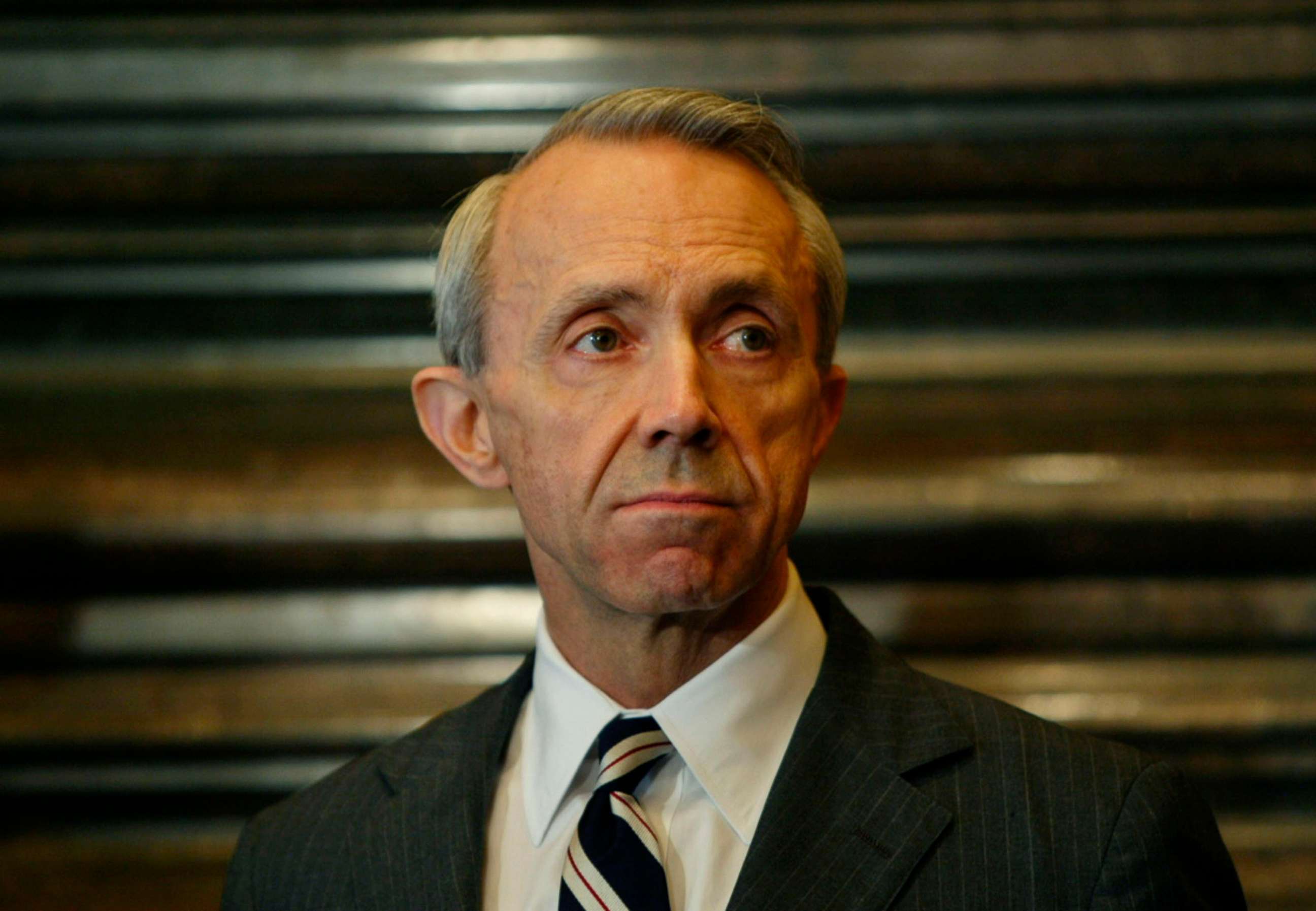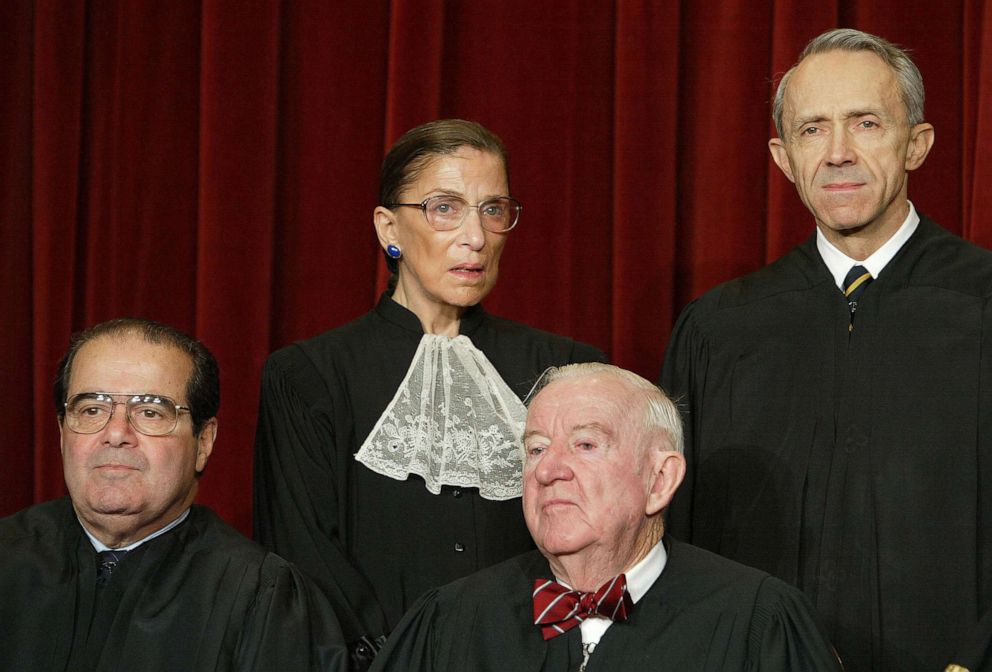The former judge of the United States Supreme Court, David Souter, a public servant of a lifetime, moderate judicial and defender of humanities and civic education, has died. He was 85 years old.
“Judge David Souter served our court with great distinction for almost twenty years,” said President of Justice, John Roberts, in a statement on Friday. “He brought unusual wisdom and kindness to a lifetime of public service. After retiring to his beloved New Hampshire in 2009, he continued to provide a significant service to our branch when sitting regularly in the Court of Appeals for the first circuit for more than a decade. It will be surprised a lot.”
Souter was nominated in 1990 by President George Hw Bush, who He praised him as “a remarkable judge of the enthusiastic intellect and the greatest ability.”

The associated judge of the United States Supreme Court, David H. Souter, attends a press conference at the Supreme Court on May 28, 2003 in Washington, DC
David Hume Kennerly/Getty images, file
In more than 19 years at the Bank, he wrote notable opinions about abortion, religion and property rights.
His moderate positions surprised and disappointed many Republicans, who expected Souter to solidify as conservative the stuff unoccupied by Judge William Brennan, a lifelong leader of the liberal wing of the Court.
Just five years after its appointment, the standard conservative weekly souter as “stealthy justice”, exciting its position as “one of the strongest liberals of the court.”
For many conservatives, Souter became a symbol of what future Republican presidents should avoid in a candidate.
His most controversial opinion came in 1992, jointly written by Judges Sandra Day O’Connor and Anthony Kennedy, reaffirming the right to abortion under Roe V. Wade and creating a “improper load” standard to judge state restrictions in the procedure.
“Cancel the fire, in the absence of the most convincing reason to examine a basin decision, would subvert the legitimacy of the court beyond any serious question,” wrote the three judges in Planned Parenthood v. Casey
The defenders of Souter have denied for a long time that it was a secret liberal, emphasizing their respect for the precedent and philosophy of “originalism”, which emphasizes the historical meaning behind constitutional clauses and federal laws.
“The original meaning of conservatism was the reluctance to adopt radical change,” Ernest Young, former Souter’s employee and Duke Law News, told ABC News in 2009.
Souter, who was episcopal, was also known for advocating the strict neutrality of the government in matters of religion and constantly opposed in religious exhibitions in public spaces.
During his confirmation hearing, he called him a “terrible fact” that Jewish children felt excluded when Christian prayers were recited in public schools.
In 2005, he was the author of a 5-4 decision that blocks three Kentucky counties by showing framed copies of the ten commandments in Courthouses and Public Schools. He also voted against allowing prayers organized in the graduation ceremonies of high school and football games.

The associated judge of the Supreme Court David H. Souter poses a photo in the United States Supreme Court on December 5, 2003 in Washington, DC.
Mark Wilson/Getty Images
“He didn’t have a predisposed response. He really trusted an analysis of [historical] Materials to decide how Stuart Benjamin, former Souter employee and Duke Law, said in 2009.
Souter was one of the four judges who strongly dissected from the decision of 2000 in Bush v. Gore, who ended Florida’s disputed vote and effectively delivered the presidency to George W. Bush.
“Flying these would be a difficult task, but before this court struggled to make the courts of Florida ready to do everything possible to do that job,” Souter wrote. “There is no justification for denying the State the opportunity to try to count all the tickets in dispute now. I respectfully remember.”
According to the reports, he was so distressed by the decision that he contemplated renouncing the Court, sources familiar with his thinking told Jeffrey Toubin, author of “The Nine, within the secret world of the Supreme Court.” Some of Justice’s friends strongly rejected the notion.
In 2005, Souter joined the most liberal members of the Court to expand the ability of local governments to confiscate private lands for public use. His vote caused fierce protests and even caused a polling stood to seize his 200 -year -old New Hampshire country house as payments. Failed.
In testimony during their confirmation hearings, Souter also surprised conservatives with a robust defense of affirmative action.
“There will be a necessity, and I fear for a longer time than we would like to say, a need for an affirmative action that seeks qualified people who have discouraged for generations of social discrimination to take their place in the main current of the United States,” he said at that time.
Souter’s rejection of political ideology was held among his former employees and friends.
“She was a classic Yankee Frugal Republican,” the former Souter employee and Harvard Tushnet’s right teacher in 2009 told ABC News in 2009.
“The Republican party has now moved considerably to the right,” the Law professor at the University of Pennsylvania, Kermit Roosevelt, which was used for Souter in 1999 and 2000, to ABC News, told ABC News. “It doesn’t seem like a modern Republican; he is not a modern person in many ways.”

Judge David Souter presents Judge Ruth Ginsburg at the Radcliffe Day Lunch, where she received the Radcliffe Medal.
Joanne Rathe/The Boston Globe through Getty Images
Souter rarely spoke publicly about his jurisprudence, but when he did, he intentionally rejected what he considered a simplistic approach to the constitutional interpretation adopted by some of his companions designated by the Republicans.
“Constitutional judgment is not a mere combination of fair reading and simple facts,” said Souter in 2010 Home Direction At Harvard University.
“The judges have to choose between the good things that the Constitution approves, and when they do, they have to choose, not on the basis of the measurement, but of meaning,” he added, rejecting the strict textualism backed by the conservative icons, Judge Clarence Thomas and late justice Antonin Scalia.
When retired with only 69 years, the Souter never married quickly escaped from Washington to return to his native New Hampshire and his beloved farm of two centuries.
For fans, Souter brought a sense of compassion to the Superior Court.
“He urged all the judges to recognize the human aspect of their decisions and to use all the power of their hearts, minds and beings to make their right decisions,” said South Southship, former president of the Carnegie Mellon University, where Souter spoke in October 2014.
Announcing Souter retirement in 2009, President Barack Obama Justice acclaim As a “impartial and independent” judge that combined a “ethic feverish work” with a good sense of humor and integrity.
“Consistently challenged the labels and rejected the absolute, focusing in its place on a single task, reaching a right result in the case in front of him,” said Obama, who later appointed Judge Sonia Sotomayor to occupy his seat.

The associated judge of the United States Supreme Court, David H. Souter, right, poses for photos in the United States Supreme Court on December 5, 2003 in Washington, DC
Mark Wilson/Getty images, file
“It was really someone who looked at himself as someone who worked in Washington but was not from Washington,” said ABC News in 2009, one of Souter’s employees in the 1990s period.
For years, he had shunned Washington’s social scene when the court was not in session, retiring to White Mountain Woods, where he loved to walk and read through the fire. Souter had no television or access to email.
“Far from being out of contact with the modern world, he has simply refused to surrender to his control over his own life that gives him deep satisfaction,” said David McKean, former CEO of the foundation of the Presidential Library John F. Kennedy, AT, AT, AT, AT, AT, AT, AT, AT, AT, AT, AT, AT, AT, AT, AT, AT, AT, AT a joint appearance With justice withdrawn in 2010.
Born in Massachusetts, a unique child, Souter spent most of his life in the rural city of Weare, New Hampshire. He enrolled at Harvard University as undergraduate student, studying philosophy and then attended the University of Oxford as a scholar of Rhodes.
He returned to Boston to complete his lawyer title in Harvard, where he graduated in 1966. He quickly raised the ranks of the legal world, increasing before the attorney general of New Hampshire and, later, a judge associated in the Supreme Court of the State.
When Souter was taken from New Hampshire by President George Hw Bush in 1990, he was little known outside the State. The United States Senate confirmed Souter to the Supreme Court by a 90-9 vote.
“I loved my colleagues. I liked the work I was doing. There were days when I wanted things to have come out differently, but I still loved the court and almost everyone in that building,” Souter said in 2010, during a rare public appearance in the JFK presidential library. “But I feel liberated from doing things I couldn’t do on that court.”
For years after leaving the Bank of the Superior Court, Souter continued to be a judge, listening to more than 300 cases by appointment for the 1st Circuit Court in Boston and authorizing dozens of opinions.
Although he remained largely outside the center of attention, Souter spoke passionately about the need to strengthen the education of humanities and civics throughout the United States.
“I don’t think there is any problem in American politics or American public life that is more significant today than generalized civic ignorance of the United States Constitution and government structure,” Souter said in a speech at the Law Faculty of the University of New Hampshire in 2012.
“Some of the current American government aspects that both people find frustrating are partly a function of people’s inability to understand how the government can and should work,” he said.
When asked in 2010 to appoint the most important part of the United States Constitution, Souter highlighted the equal protection clause of the 14th amendment.
“Ultimately, it’s the golden rule,” he said. “Try others the way they want them to treat it with the corollary that if it does not, it will not be treated in that way.”
Huma Khan of ABC News contributed to this report.


